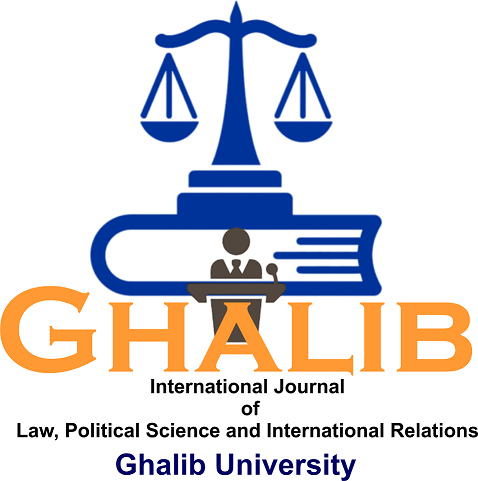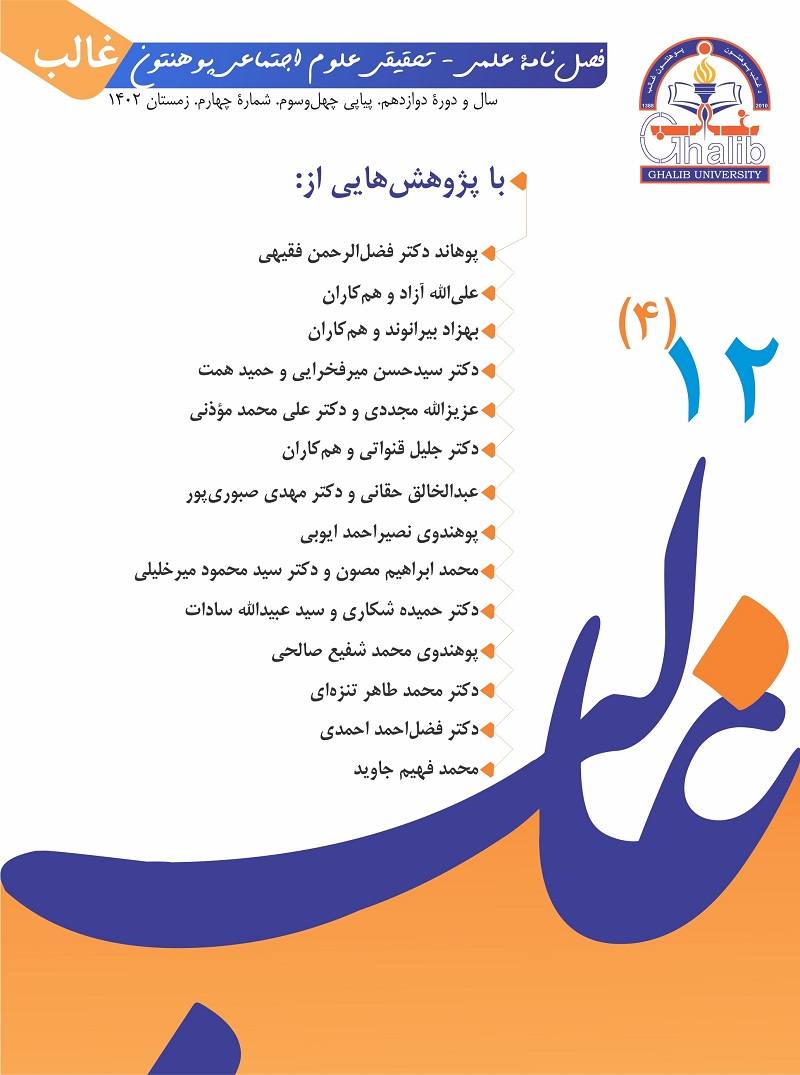رویکرد امام ابوحنیفه(رح) در قبال حق مشارکت در امور سیاسی و دولتداری
DOI:
https://doi.org/10.58342/ghalibqj.V.12.I.4.13واژهگانِ کلیدی:
امام ابوحنیفه، حق مشارکت، سیاست، دولتداری، تعهد و تخصصچکیده
امام ابوحنیفه، بهعنوان فقیه و پیشوای تدوین قواعد حقوقی، از تعریفوتمجید بینیاز است. او که در میان سالهای 80 تا 150 هـ میزیست، ازلحاظ سیاسی با حاکمان همعصر خویش میانه خوبی نداشت و از همین رو شخصاً وارد مناصب دولتی نشد و هرازگاهی رفتار و رویکرد حاکمان را بهشدت تمام مورد انتقاد قرار میداد و انتخاب مقامهای دولتی را از سوی حاکمان براساس تعصب قومی- نژادی، زبان و سایر عرضیات میدانست و خود همیشه احراز مناصب دولتی را براساس تعهد و تخصص حق هر مسلمان میپنداشت. این مسأله زمانی بااهمیتتر میشود که حق مشارکت در امور دولتداری و امور سیاسی برای هر مسلمان براساس آیات و روایات به اثبات میرسد. این پژوهش که به بررسی این مسأله پرداخته است، در پی پاسخ به این سؤال بوده که: امام ابوحنیفه چه نظر و دیدگاهی در قبال حق مشارکت در امور سیاسی و دولتداری داشت و معیارهای انتخاب در مناصب دولتی ازنظر وی چه بود؟ با استفاده از روش توصیفی- تحلیلی و با کمک از منابع کتابخانهیی، به این نتیجه دستیافتیم که امام ابوحنیفه مشارکت در امور سیاسی و دولتداری را حق همه مسلمانان میدانست و تنها معیارهای انتخاب مقامات دولتی را تعهد و تخصص یا همان تقوا و کاردانی اشخاص میدانست و هیچ نوع تعصبی را در این زمینه قبول نداشت.
سرچشمهها/ منابع
قرآنِ کریم.
ابن تیمیه، احمد بن عبدالحلیم. (بیتا). السیاسة الشرعیة فی اصلاح الراعی و الرعیة. تحقیق: علی بن محمد العمران. نشر و التوزیع: دار علم الفوائد.
احمدی، فضل احمد. (1401). «امام ابوحنیفه و مبارزه با استبداد سیاسی». هرات: فصلنامۀ علمی-پژوهشی علوم اجتماعی دانشگاه غالب. 11(4). صص 57 تا 76. https://doi.org/10.58342/ghalibqj.V39.I4.6
احمدی، فضل احمد. (1402). «رویکرد امام ابوحنیفه در قبال اعتدال و میانهروی». هرات: فصلنامۀ علمی-پژوهشی علوم اجتماعی دانشگاه غالب، 12(2). صص 155 تا 172. https://doi.org/10.58342/ghalibqj.V.12.I2.9
البخاری، محمد بن اسماعیل. (1998). صحیح البخاری. اعتنی به: ابو صهیب الکرمی. مملکه العربیه السعودیه_ ریاض: بیت الافکار الدولیه للنشر و التوزیع.
بغدادی، الامام ابو بکر احمد بن علی بن ثابت الخطیب. (2004). تاریخ البغداد. ضبط و تحقیق صدقی جمیل العطار. الجزء الحادی عشر. الطبع الاولی. بیروت- لبنان: دارالفکر.
بلخی، مولانا جلالالدین محمد. (1401). مجموعه مقالات (فیه ما فیه). ویرایش متن: جعفر مدرّس صادقی. چ18. تهران: نشر مرکز.
خلاف، عبدالوهاب. (1977). السیاسه الشرعیه او نظام الدوله الاسلامیه فی الشئون الدستوریه و الخارجیه و المالیه. مصر- القاهره: دارالانصار.
الذهبی، الامام الحافظ شمسالدین محمد بن احمد بن عثمان. (1408). مناقب الإمام ابی حنیفه و صاحبه ابی یوسف و محمد بن الحسن. الطبعه الثالثه. بیروت- لبنان. بحیدر آباد الدکن بالهند: لجنه إحیاء المعارف النعمانیه.
رحیمی، عبدالحمید. (1390). «آراء و اندیشههای فقهی، اصولی، کلامی و سیاسی امام ابوحنیفه». مجموعه مقالات پژوهشی بررسی آراء و اندیشههای امام ابوحنیفه. گردآوری: موسی عزیری. صص 51 تا 103.
الزحیلی، وهبه. (1985). الفقه الاسلامی و ادلته. ج 4. الجزء الرابع(النظریات الفقیه و العقود). الطبعه الثانیه. دمشق-سوریا: دارالفکر للطباعه و التوزیع و النشر.
سید قطب. (1378). عدالت اجتماعی در اسلام. ترجمة سیدهادی خسروشاهی و محمد علی گرامی. بیجا.
شرباصی، احمد. (1392). چهار امام اهل سنت. ترجمة محمود ابراهیمی. چ 2. ایران: انتشارات کردستان.
الصیمری، القاضی ابی عبدالله حسین بن علی. (1985). اخبار ابی حنیفه و اصحابه. الطبعه الثانیه. بیروت- دمشق: عالم الکتب.
طحاوی، امام ابوجعفر احمد بن محمد. (1389). عقیدة طحاوی. ترجمۀ سعدی محمودی. چ 1. تهران- ایران: نشر احسان.
عطوان، حسین. (1991). الفقهاء و الخلافه فی العصر الأموی. الطبعه الاولی. بیروت- لبنان: دارالجیل.
قرضاوی، یوسف. (1396). فقه سیاسی. ترجمۀ عبدالعزیز سلیمی. چ 5. تهران- ایران: نشر احسان.
مسلم، ابی الحسن مسلم بن حجاج. (1998). صحیح مسلم. اعتنی به: ابوصهیب الکرمی. المملکه العربیه السعودیه- الریاض. بیت الافکار الدولیه للنشر و التوزیع.
هروی، عبدالرحیم فیروز. (1395). مال حرام و احکام آن در اسلام. چ 1. هرات- افغانستان: نشر محمدی.
الهیتمی، الشیخ شهابالدین احمد بن حجر. (بیتا). الخیرات الحسان فی مناقب الامام الاعظم أبی حنیفه النعمان. طبع علی تفقه مولوی محمد عبدالله جیتیکر و شرکائه فی بومی الهند سنه 1324 (طبع بمطبعه السعاده بجوار محافظه مصر).
References
Holy Quran (Arabic).
Ibn Taymiyyah, Ahmad Ibn Abdul Halim (B.T.A). Al-Siyasah al-Sharia fi reform al-Ra’i and al-Rai’ah, research: Ali bin Muhammad Al-Omran, publishing and al-Tawzi’ah; has knowledge of benefits. Publishing and al-Tawzi’ah; has knowledge of benefits. (Arabic).
Ahmadi, Fazal Ahmad (2022). "Imam Abu Hanifah and the fight against political tyranny", Ghalib University's scientific-research journal of social sciences, 11th publication year, 39th series, 4th issue, winter 1401, pages 57-76.(Persian). https://doi.org/10.58342/ghalibqj.V39.I4.6
Ahmadi, Fazal Ahmad (2023). "Imam Abu Hanifah's approach towards moderation", Ghalib University's scientific-research journal of social sciences, 12th period and year of publications, number two, summer 1402, pages 155 to 172.(Persian). https://doi.org/10.58342/ghalibqj.V.12.I2.9
Al-Bukhari, Muhammad bin Ismail, (1998).Sahih Al-Bokhari, Bayt al-Afkar al-Dawliyya for publication and distribution. (Arabic).
Khalaf, Abdul Wahab (1977). Al-Siyasa al-Sharia and Nizam al-Dawlah al-Islamiyya fi al-Shaon al-Dosturiya and al-Kharjiya and Maliya, Egypt-Cairo; 0 Dar al-Ansar. (Arabic).
Al-Dhahabi, Al-Imam al-Hafiz Shams al-Din Muhammad bin Ahmad bin Othman. (1408). Imam Abi Hanifa and Sahiba Abi Yusuf and Muhammad bin Al-Hassan. The third edition. Beirut-Lebanon, Bahidr Abad al-Dakn in India: Al-Nu'maniyah Encyclopaedia Revival Committee. (Arabic).
Rahimi, Abdul Hamid (1390). "The jurisprudential, principled, theological and political opinions and thoughts of Imam Abu Hanifah", (a collection of research articles examining the opinions and thoughts of Imam Abu Hanifah, compiled by Musa Aziri), pages 51 to 103. (Persian).
Al-Zahili, Wahba, (1985). Islamic jurisprudence and justice, the fourth part (the theories of jurisprudence and contracts), the second edition, Damascus-Syria: Dar al-Fikr for printing and distribution and publishing. (Arabic).
Seyed Qutb, (1378). Social justice in Islam, translated by Seyedhady Khosrowshahi and Mohammad Ali Garami, bija. (Persian).
Sharbasi, Ahmed (2012). Four Sunni Imams, translated by: Mahmoud Ebrahimi, second edition, Iran; Kurdistan Publications. (Persian).
Al-Saimiri, al-Qazi Abi Abdullah Hossein bin Ali. (1985). News of Abi Hanifah and his companions. Second edition Beirut-Damascus: Alam al-Katb. (Arbic).
Tahawi, Imam Abu Jaafar Ahmed bin Muhammad. (1389). Aqeed Tahawi, translation: Saadi Mahmoudi, first edition, Tehran-Iran: Ehsan publishing house. (Persian).
Atwan, Hossein. (1991). Jurisprudents and Caliphate in the Umayyad Era, first edition, Beirut-Lebanon: Dar al-Jeel. (Arabic).
Qaradawi, Yusuf, (2016). Political Jurisprudence. Translation: Abdulaziz Salimi, fifth edition, Tehran-Iran: Ehsan Publishing House. (Persian).
Muslim, Abi al-Hasan Muslim bin Hajjaj, (1998). Sahih Muslim, attention to: Abu Suhaib Al-Karami, Al-Malmakah Al-Arabiya Al-Saudiya- Al-Riyadh, Bayt al-Afkar al-Dawliyya for publication and distribution.(Arabic).
Heravi, Abdur Rahim Firoz, (2015). Haram property and its rulings in Islam, first edition, Herat-Afghanistan; Mohammadi publication. (Persian).
Al-Hitami, Al-Sheikh Shahab al-Din Ahmed bin Hajar. (Beta). Al-Khairat al-Hassan fi Manaqib al-Imam al-Azam Abi Hanifah al-Numan. Taba Ali Faqe Maulvi Muhammad Abdullah Jitiker and his partners in Bumi Hind year 1324 (printed at the Al-Saada Press next to the Egyptian Conservatory). (Arabic).
چاپ شده
ارجاع به مقاله
شماره
نوع مقاله
مجوز
حق نشر 2023 دکتر فضل احمد احمدی

این پروژه تحت مجوز بین المللی Creative Commons Attribution 4.0 می باشد.













